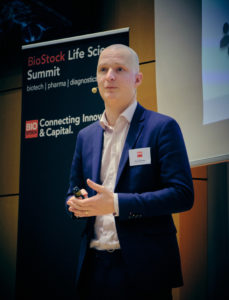
Immunicum’s immuno-oncology platform shares the spotlight at Cancer Progress conference
The field of immuno-oncology encompasses several strategies to push our own immune system to be more sensitive and reactive to cancer cells and metastases. Swedish biotech Immunicum have developed their own strategy and were asked to present and discuss it on a panel of immuno-oncology experts at the 31st Annual Cancer Progress Conference last week. BioStock caught up with Immunicum’s COO, Sijme Zeilemaker, who represented the company on that panel, to learn more about the discussion and how Immunicum is making a difference in the field.
Immuno-oncology (IO) has made a name for itself in the realm of cancer therapy as one of the most promising solutions to this deadly disease. The field has generated several treatments based on the use of immune cells, e.g., adjuvant immunotherapy, T-cell therapies, and checkpoint inhibitors (CPIs), over the past decade and has been able to bring down the mortality rate for most cancers. However, the need for even better treatments remains high, and several immuno-oncology strategies are currently being devised as potential solutions.
Different IO approaches to fool cancer
One of the main reasons cancer is so deadly is the fact that cancer cells are able to evade the defence mechanisms of the immune system in order to keep multiplying within the body. Therapies based on IO have become popular thanks to their ability to teach the immune system to be more receptive to cancer cells and thus become more reactive before the cancer takes over the body.
However, IO is a complex field that involves testing several innovative approaches for priming the immune system to better fight cancer. No one yet knows which strategy or combination of strategies will deliver the best treatments, but the topic is often a major point of discussion at international conferences focused on oncology.
One of these approaches is to develop an off-the-shelf allogeneic cell therapy able to be injected inside the tumour itself and cause a chain reaction within the immune system where inflammatory molecules called chemokines and cytokines call upon killer T-cells to recognise and attack the tumour cells.
Immunicum pitches off-the-shelf IO approach at state-of-the-art conference
![]() The off-the-shelf allogeneic cell therapy approach is the one taken by Stockholm-based Immunicum, who have been testing their top candidate, ilixadencel, in Phase II clinical trials with Metastatic Renal Cell Carcinoma patients (the MERECA study). To find out more about their approach and the Phase II study, read here.
The off-the-shelf allogeneic cell therapy approach is the one taken by Stockholm-based Immunicum, who have been testing their top candidate, ilixadencel, in Phase II clinical trials with Metastatic Renal Cell Carcinoma patients (the MERECA study). To find out more about their approach and the Phase II study, read here.
The company was invited to present at the 31st Annual Cancer Progress Conference, which was held virtually due to the Covid-19 pandemic between May 5 and 6, 2020. The conference itself was organised by Cello Health, and brought together innovators in the field from all over the world. It also featured the participation of major oncology institutions like the Cancer Research Institute, a non-profit organisation dedicated to advancing immunotherapy for treating and curing cancer, which refers to immunotherapy as “the most promising treatment of our time.”
COO of Immunicum Sijme Zeilemaker participated at the conference by taking part in a panel discussion titled, Paradigm-shifting platforms I, IO: Taking IO to the next Level. He was joined by representatives of six other companies working on different IO platforms, and they all pitched their innovative initiatives using their respective strategies. See the full program and list of panellists here.
BioStock reached out to Sijme Zeilemaker to ask him about the discussion and how Immunicum’s IO strategy fits within the field.

Sijme Zeilemaker, first of all, what does it mean to you and to Immunicum as a whole to be able to participate in a panel discussion at this cancer conference?
– It is great to be recognised as a novel platform among all the exciting developments in the highly competitive field of immuno-oncology. The unique character of our approach was central to being part of this panel of paradigm-shifting platforms, in which highly differentiated platforms that may become the future of cancer therapy shared the spotlight.
Could you summarise, in a few words, the take-home message of the panel discussion?
– Science is moving at an extraordinary pace especially in the field of IO in which the high unmet needs create this urgency of development. The overlapping message from these different platforms was that the future of cancer therapy requires a highly personalised and tumour-specific immune response induced by a more potent and broader mechanism of action. This mechanism of action should involve different classes of immune cells, preferably combined with an off-the-shelf manufacturing ability to be able to address patients across the globe in a cost-effective way. The advent of cell therapies and allogeneic platforms was crucial to this discussion.
Immunicum’s main candidate, ilixadencel, is a so-called off-the-shelf allogeneic approach. In simple terms, what does that mean exactly?
– It means that this cell therapy does not derive from the patient’s own cells, but can be produced from a healthy donor (thus allogeneic), and thereby in a more consistent, cost-effective and scalable manner. Specific to our mechanism of action, our cells are able to be derived from healthy donors as we activate these specific immune cells to become inflammatory dendritic cells (DCs) as the central kick-starters of immunity against the tumour. The allogeneic nature of the cells actually contributes to this mechanism, activating the patient’s own immune cells as the ones to ultimately carry out a strong and sustained tumour-specific immune response.
»Ultimately, the hope of immuno-oncology is not just to delay cancer growth as with more traditional cancer therapies, but to lead to durable tumour decreases and even potential cures. Immunicum has observed this where the treatment of ilixadencel induced more durable and complete responses in its recently completed Phase II study in kidney cancer« — Sijme Zeilemaker, COO at Immunicum
How does this approach differ from some of the others presented at the panel discussion?
– The panel included approaches to enhanced tumour radiation, an allogeneic mixed cell therapy, and bispecific antibodies. Each is able to address parts of the cancer immunity cycle, i.e. all elements of the immune system needed to recognize and attack cancer, by for example inducing immunogenic tumour cell death, activating Natural Killer (NK) cells, or stimulating the expansion of immune cells.
– Unfortunately, cancer has established itself with multiple defence mechanisms, and only targeting one such mechanism while leaving open other pathways allows for cancer evasion and escape. Immunicum’s ilixadencel primarily addresses this by focusing on a more complete mechanism of priming the immune system: by injecting inflammatory DCs in the immunosuppressive environment of the tumour and inducing a cascade of immune cells, such as NK cells, bystander DCs and killer T cells, to counteract the tumour cells.
In broader terms, how does Immunicum’s approach stack up with other IO approaches being used, in terms of benefit for the patient, and why do you think the Cancer Research Institute refers to immunotherapy as “the most promising treatment of our time?”
– Our preclinical and clinical data suggest that this more complete mechanism of action is synergistic to systemic therapies such as kinase inhibitors and checkpoint inhibitors to enable the activated immune response to fully carry out its cancer-killing ability. Ultimately, the hope of immuno-oncology is not just to delay cancer growth as with more traditional cancer therapies, but to lead to durable tumour decreases and even potential cures. Immunicum has observed this where the treatment of ilixadencel induced more durable and complete responses in its recently completed Phase II study in kidney cancer.
The content of BioStock’s news and analyses is independent but the work of BioStock is to a certain degree financed by life science companies. The above article concerns a company from which BioStock has received financing.


